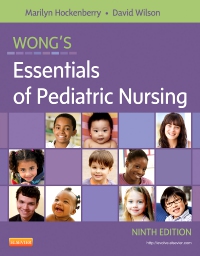
Wong's Essentials of Pediatric Nursing - Elsevier eBook on VitalSource, 9th Edition
Elsevier eBook on VitalSource

When it comes to caring for children, no other resource better prepares students for practice than Wong’s Essentials of Pediatric Nursing. Authored by Marilyn Hockenberry and David Wilson, two of the most well-known and respected names in the field, Wong’s features the most readable, up-to-date, and accurate content available. An abundance of full-color illustrations helps students visualize key concepts, and highlighted boxes and tables offer quick access to vital facts and information. Plus, this edition comes with unlimited access to hands-on study tools that help your students learn pediatric nursing essentials with ease!
Newer Edition Available
Wong's Essentials of Pediatric Nursing - Elsevier eBook on VitalSource
-
- NEW! Quality Patient Outcomes content in Nursing Care Management discussions for major diseases and disorders helps students understand how the care they provide impacts patient safety and promotes positive outcomes.
- NEW! Safety Alerts call attention to important patient safety considerations and support the QSEN initiative for better outcomes of nursing care.
- UNIQUE! Critical thinking case studies allow students to test and develop their analytical skills in a variety of clinical situations.
- Completely updated content focuses on timely, practical topics, including methods for measuring competency and outcomes, the nurse’s role in injury prevention, shaken baby syndrome/traumatic brain injury, Healthy People 2020, car restraints, immunizations, late preterm infants, and childhood obesity.
- UNIQUE! Evidence-Based Practice boxes demonstrate how research is applied to nursing care in the clinical setting.
- UNIQUE! Family focus includes a separate chapter on the role of the family in child health, family content throughout the text, and Family-Centered Care boxes that highlight information on patient teaching, home care, and incorporating the family in the child's care.
- NEW! Drug Alerts throughout the text emphasize important drug information and point out potential issues.
- NEW! Pathophysiology Reviews highlight and clarify complex pathophysiology information.
- UNIQUE! Atraumatic Care boxes provide guidance for administering nursing care with minimal pain or stress to the child, family, and nurse.
- Developmental approach clearly identifies key issues at each stage of a child’s growth to help students provide appropriate, individualized care for each child.
- Expanded and updated coverage of genetics addresses the latest advances in the field as it relates to children in health and illness.
- An emphasis on wellness offers health promotion and injury prevention strategies for each age group.
-
- NEW! Safety Alerts call your attention to important patient safety considerations and support the QSEN initiative for better outcomes of nursing care.
- NEW! Quality Patient Outcomes content in Nursing Care Management discussions for major diseases and disorders helps you understand how the care you provide impacts patient safety and promotes positive outcomes.
- UNIQUE! Critical thinking case studies allow you to test and develop your analytical skills in a variety of clinical situations.
- NEW! Drug Alerts throughout the text emphasize important drug information and point out potential issues.
- NEW! Pathophysiology Reviews highlight and clarify complex pathophysiology information.
- Completely updated content focuses on timely, practical topics, including methods for measuring competency and outcomes, the nurse’s role in injury prevention, shaken baby syndrome/traumatic brain injury, Healthy People 2020, car restraints, immunizations, late preterm infants, and childhood obesity.
- Expanded and updated coverage of genetics addresses the latest advances in the field as it relates to children in health and illness.
-
Unit One: Children, Their Families, and the Nurse
- Perspectives of Pediatric Nursing
- Community-Based Nursing Care of the Child and Family
- Family Influences on Child Health Promotion
- Social, Cultural, and Religious Influences on Child Health Promotion
- Developmental and Genetic Influences on Child Health Promotion
Unit Two: Assessment of the Child and Family
- Communication, History, and Physical Assessment of the Child
- Pain Assessment and Management in Children
Unit Three: The Newborn
- Health Promotion of the Newborn and Family
- Health Problems of Newborns
Unit Four: Infancy
- Health Promotion of the Infant and Family
- Health Problems of Infants
Unit Five: Early Childhood
- Health Promotion of the Toddler and Family
- Health Promotion of the Preschooler and Family
- Health Problems of Toddlers and Preschoolers
Unit Six: Middle Childhood and Adolescence
- Health Promotion of the School-Age Child and Family
- Health Promotion of the Adolescent and Family
- Health Problems of School-Age Children and Adolescents
Unit Seven: The Child and Family with Special Needs
- Quality of Life for Children Living with Chronic or Complex Diseases
- Impact of Cognitive or Sensory Impairment on the Child and Family
- Family-Centered Home Care
Unit Eight: Impact of Hospitalization on the Child and Family
- Family-Centered Care of the Child During Illness and Hospitalization
- Pediatric Variations of Nursing Interventions
Unit Nine: The Child with Problems Related to the Transfer of Oxygen and Nutrients
- The Child with Respiratory Dysfunction
- The Child with Gastrointestinal Dysfunction
Unit Ten: The Child with Problems Related to the Production and Circulation of Blood
- The Child with Cardiovascular Dysfunction
- The Child with Hematologic or Immunologic Dysfunction
Unit Eleven: The Child With a Disturbance of Regulatory Mechanisms
- The Child with Genitourinary Dysfunction
- The Child with Cerebral Dysfunction
- The Child with Endocrine Dysfunction
- The Child with Integumentary Dysfunction
Unit Twelve: The Child with a Problem that Interferes with Physical Mobility
- The Child with Musculoskeletal or Articular Dysfunction
- The Child with Neuromuscular or Muscular Dysfunction
Appendixes
A. Growth Measurements
B. Common Laboratory Tests
C. Translations of Wong-Baker FACES Pain Rating Scale
D. Spanish-English Translations
